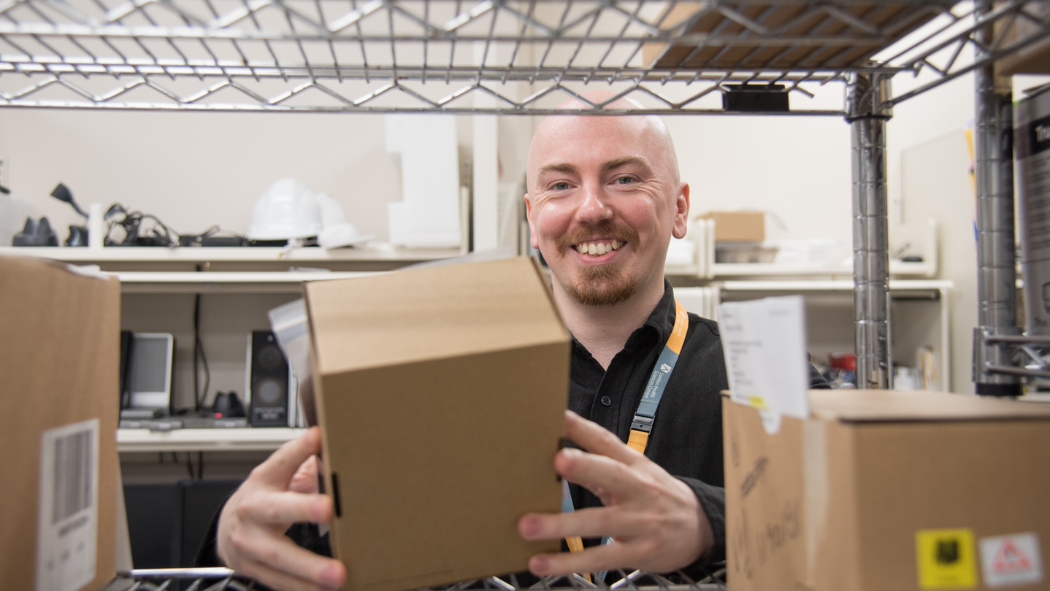
Daniel Collins, a Client Support Specialist at London Health Sciences Centre's (LHSC) Information and Technology Services (ITS) department, helps provide technical support, cybersecurity support, and hardware support to teams.
June 25, 2025
At London Health Sciences Centre (LHSC), the Information Technology Services (ITS) team works behind the scenes – and behind the screens- to improve patient safety every day. Daniel Collins, a Client Support Specialist, has worked on the ITS team for the past two years. Prior to that, Collins spent nine years working in various non-clinical support roles including patient area sanitation and portering at LHSC.
How does ITS support Patient Safety?
Collins and his colleagues provide technical support, cybersecurity support, and hardware support for staff, physicians and patients. “My role is to assist staff and physicians in using a wide variety of computer technologies including software applications and IT hardware so that our clients have the IT tools necessary in order to provide optimum patient care,” says Collins. This includes a variety of software systems used in clinical settings, as well as electronic health records. While primary assistance is for the teams who provide patient care, the IT team members do occasionally provide direct support to patients who may need help with a virtual care appointment.
Information Technology Services provides tools and solutions to clinical staff members and non-clinical staff members. ITS team members help make sure staff and physicians have the tools and the most up to date information for their role, and that information is being utilized safely, following all requirements and security policies.
Part of Collins role is to help clinicians get started with their LHSC electronic accounts. “We provide a brief tutorial on our systems, and get them logged in, so they're able to work with their patients’ data,” explains Collins. “This could mean booking their next patient appointment or getting the critical data that they need to help our patients.”
Collins is proud that he and his colleagues can offer clinicians that type of support in the moment.
Part of the ITS role is to help foster a healthy relationship between staff and physicians, and technology by encouraging a healthy respect for its use and promoting understanding of how it supports patient care and improves patient safety at LHSC.
Protecting patient information
“I play a role with cybersecurity as a frontline staff member in terms of interacting with our staff, physicians and patients in our community who may call us” says Collins.
ITS assists staff and physicians in understanding rules and requirements around technology, such avoiding the use of personal email on LHSC devices and following access protocols to safeguard the network and PHI. “Sometimes we need to remind team members about the current policies and procedures, and the tools we have to help them,” says Collins.
Collins also cautions about the potential issues with using cloud technologies and the importance of multifactor authentication systems. Multifactor Authentication (MFA) adds additional layers of security by validating your identity in multiple ways, in addition to your password. Usually, MFA utilizes something you have in your possession such as a push notification or an MFA code on your phone. "It may mean that there's one more screen to click through or one more password, but these are all in service of patient safety,” explains Collins. “It helps keep our systems and information more secure.”
What does Patient Safety mean to you?
“Patient safety is critical. In the modern day, as we move forward with more advanced technologies, it's about keeping our patients safe, not only in a physical capacity, but with using safe technologies, safe policies and procedures, and protecting their information from malicious actors worldwide.”
LHSC has built up a team of people that specialize in various aspects of technology. “Helping make sure they are able to utilize these advanced technologies, and to provide support is a very good feeling to be able to contribute to LHSC and my community at large,” says Collins. “Being a piece of the puzzle, is an honor; we all have our part to play.”
Patient Safety at LHSC video (October 2024):